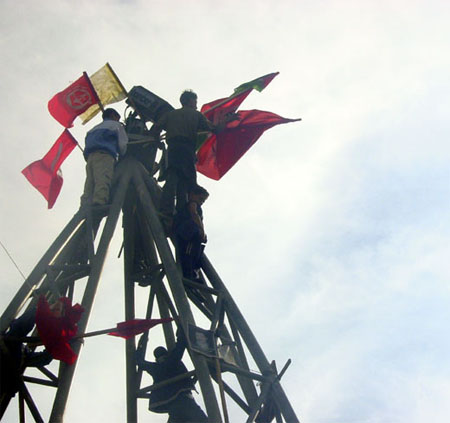
Photo: stopthewall.org
|
 Photo: stopthewall.org |
Umm Ghassan, Manar Dordona, Jabaliya town, April 16:
|
|
Friends in Beirut told me about Manar Dordona. Born in a refugee camp in Lebanon, she had married a man from Gaza. After 1982 when the PLO headquarters moved to Tunis, she had stayed with the children for a while in Lebanon, then moved to Syria. Finally, after the Oslo Accords, she had returned with him to his home in Jabaliyya town. Marriages between Palestinians of different areas were quite common during the 'ayyam al-thawra' ('days of the revolution') in Lebanon (1970-1982). They often caused dislocation: wives might be left behind in Lebanon, or choose not to leave, causing problems for the children since the government did not recognize their residence rights, and UNRWA didn't recognize their right to services. In other cases wives followed the husband, sometimes meeting problems of integration in a different social atmosphere. Such dislocations were sharpest in the case of those who moved from Lebanon to Gaza.
The Dordona's comfortable apartment and relaxed atmosphere suggest that Manar - she doesn't like the old-fashioned practice of calling women 'Umm so-and-so' - is luckier than many 'Lebanese' Palestinian women who have moved to Gaza. Her husband is a citizen, they have an orchard and their own home. She misses her |
family in Lebanon - visits and phone calls are impossible, and there's no direct mail. At first she was worried about her three daughters (two of them adolescents), that they would be forced to wear the hijab, and suffer from the lack of social freedom. I ask the girls if they put on the headscarf outside the house. They say 'No'. Their clothes are the casual wear of teen-age girls in Lebanon.
Possibly such moves are lightened if a woman is politicized. An ideology of belief in Palestinian unity may give strength in facing problems that arise from the real differences between diaspora regions - differences that are increasing with time, as young Palestinians are forced to study in multiple languages and academic systems. 'Home' can be a place not necessarily familiar or comfortable, possibly a site of separation from family, friends, and opportunities. Manar Dordona begins her story:"We migrated in 1948 - we're originally from Akka, from the villages near Akka, but we say we're from Akka. My family fled in 1948, they went to Beirut. I was born in 1952, four years after the hijra. Of course I don't remember the first period, they were in Bourj Barajnah camp, in tents..." |
[Mariam Abu Dakka] [Jean Calder] Copyright©2005 |
|